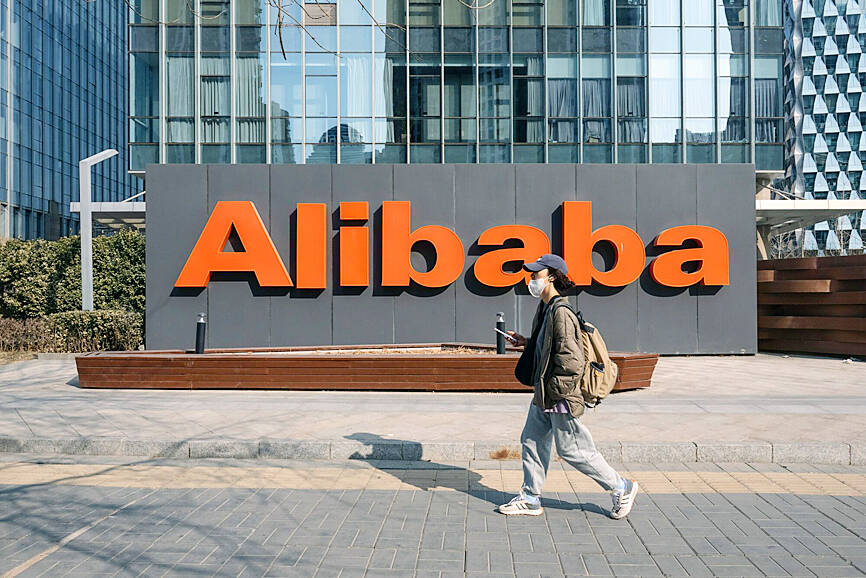Chinese e-commerce firm Alibaba Group Holding Ltd (阿里巴巴) on Wednesday approved an additional US$25 billion authorization to its share buyback program, after reporting lower-than-expected sales revenue for the final quarter of last year.
The company’s Hong Kong-traded shares plunged 6.8 percent yesterday. Alibaba’s New York-listed stock price sank 5.9 percent on Wednesday and has fallen nearly 26 percent over the past year.
Alibaba posted a 5 percent annual increase in sales to 260.3 billion yuan (US$36.35 billion) in the quarter that ended in December last year, slightly missing analysts’ estimates. Net income sank to 14.4 billion yuan, down 77 percent compared to a year earlier.

Photo: Bloomberg
The Hangzhou, China-based firm attributed the drastic decrease to declining values of its equity investments and falling revenues.
Alibaba has struggled to sustain its growth and faces increasing competition in the e-commerce sector from rivals such as PDD Holdings Inc (拼多多), which operates Pinduoduo, and ByteDance Ltd (字節跳動), which runs both TikTok and Douyin (抖音).
On a call with analysts, Alibaba chairman Joseph Tsai (蔡崇信) said that the company no longer plans to list shares in its logistics unit Cainiao Smart Logistics Network Ltd (菜鳥網路) and its Freshippo (盒馬鮮生) grocery business unit, given “challenging market conditions.”
Earlier, the group scrapped plans to spin off its cloud business, citing uncertainties over US export curbs on advanced chips used for artificial intelligence.
Alibaba is looking to sell off some of its non-core holdings, including several retail operations, he said.
“We have a number of traditional physical retail businesses on our balance sheet, and these are not our core focus,” Tsai said.
The company initially restructured its businesses in March last year, splitting them into six units that would eventually raise their own capital and go public to improve shareholder value.
Trying to rev up its growth, in December last year Alibaba named current chief executive officer Eddie Wu (吳泳銘) as the new head of its e-commerce business, replacing longtime Alibaba executive Trudy Dai (戴珊). That came weeks after rival PDD surpassed Alibaba in market value.

Taiwan Semiconductor Manufacturing Co (TSMC, 台積電) last week recorded an increase in the number of shareholders to the highest in almost eight months, despite its share price falling 3.38 percent from the previous week, Taiwan Stock Exchange data released on Saturday showed. As of Friday, TSMC had 1.88 million shareholders, the most since the week of April 25 and an increase of 31,870 from the previous week, the data showed. The number of shareholders jumped despite a drop of NT$50 (US$1.59), or 3.38 percent, in TSMC’s share price from a week earlier to NT$1,430, as investors took profits from their earlier gains

In a high-security Shenzhen laboratory, Chinese scientists have built what Washington has spent years trying to prevent: a prototype of a machine capable of producing the cutting-edge semiconductor chips that power artificial intelligence (AI), smartphones and weapons central to Western military dominance, Reuters has learned. Completed early this year and undergoing testing, the prototype fills nearly an entire factory floor. It was built by a team of former engineers from Dutch semiconductor giant ASML who reverse-engineered the company’s extreme ultraviolet lithography (EUV) machines, according to two people with knowledge of the project. EUV machines sit at the heart of a technological Cold

AI TALENT: No financial details were released about the deal, in which top Groq executives, including its CEO, would join Nvidia to help advance the technology Nvidia Corp has agreed to a licensing deal with artificial intelligence (AI) start-up Groq, furthering its investments in companies connected to the AI boom and gaining the right to add a new type of technology to its products. The world’s largest publicly traded company has paid for the right to use Groq’s technology and is to integrate its chip design into future products. Some of the start-up’s executives are leaving to join Nvidia to help with that effort, the companies said. Groq would continue as an independent company with a new chief executive, it said on Wednesday in a post on its Web

CHINA RIVAL: The chips are positioned to compete with Nvidia’s Hopper and Blackwell products and would enable clusters connecting more than 100,000 chips Moore Threads Technology Co (摩爾線程) introduced a new generation of chips aimed at reducing artificial intelligence (AI) developers’ dependence on Nvidia Corp’s hardware, just weeks after pulling off one of the most successful Chinese initial public offerings (IPOs) in years. “These products will significantly enhance world-class computing speed and capabilities that all developers aspire to,” Moore Threads CEO Zhang Jianzhong (張建中), a former Nvidia executive, said on Saturday at a company event in Beijing. “We hope they can meet the needs of more developers in China so that you no longer need to wait for advanced foreign products.” Chinese chipmakers are in